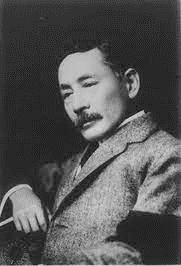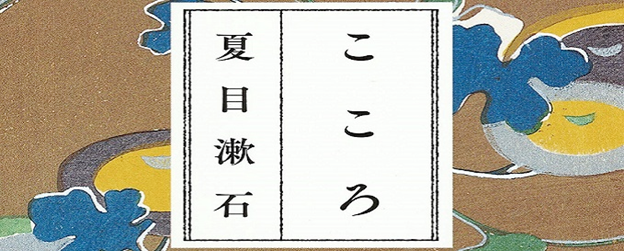The Question of Love in Kokoro, by Natsume Soseki
僕の心
The Question of Love in Kokoro, by Natsume Soseki

The year is 1914. Many years prior, Japan had undergone one of the fastest transitions to modernisation the world has ever seen, and what took the Western Powers centuries took Japan a mere four decades to achieve. By the time the Taisho (大正) era rolled around, Japan had become the most advanced country in the East, on par with the West’s technology and ideology. A prominent writer who emerges from this transitional era is Natsumi Soseki (夏目礎石). Soseki eventually goes on to write Kokoro (心), once known as Kokoro: Sensei’s Statement (心:先生の遺書), and again simplified to its native hiragana form, (こころ).
One may ask, what exactly is Kokoro?
For Soseki, I believe it is his way of reckoning with a transitory society, where the infatuation with the West and the phenomena of Westernisation had shaken the very foundations of a deep-seated Japanese traditionality. Kokoro is a testament to humanity, shame and guilt, and a reckoning with transitions. It is a story of a young graduate’s journey with an unnamed man called Sensei (teacher) as he navigates the chaos of cosmopolitan Tokyo and the simplicity of country life. Though Kokoro in its raw Japanese form means heart, it also means spirit and mind. And if used in its transitive form (i.e., 心得る), it also means understanding. And I believe it is in the attempt of understanding that one may fully comprehend the main message behind Kokoro.
[My Father and The Country]
“A fine thing you’ve graduated”—he repeated these words again and again. In my heart, I compared my father’s joy with Sensei’s reaction at the dinner table after the graduation ceremony. He had said “Congratulation,” but his private disdain was evident in his face. Sensei, I thought, was more cultured and admirable than my father, with his unashamed delight. In the final analysis, what I felt was displeasure at the reek of country boorishness in my father’s innocence.
…
(Soseki 79)
I’ve added a little snippet of a conversation between the narrator and his father. For some background information, this is where our main protagonist goes back home to the countryside from Tokyo for a visit following his graduation. Before this exchange, we learn that the narrator had to return home to visit his ailing father, who had been in ill health and was supposedly irrecuperable. He presents to his father good news about his graduation but also compares his father’s demeanour to that of Sensei’s, eliciting in him mixed feelings about his father’s “country” ways, and a sentimental heartfelt conversation ensues.
Having spent many years in the city of Tokyo, the narrator’s father (let’s call him Father) and his country ways are boorish and throw the narrator off. The country and its inhabitants are atavistic to the narrator, and he begins comparing his father’s demeanour to that of Sensei. Now, the narrator partly worships Sensei because of how nonchalant and cultured he may seem. But Father, however, seems to pale in comparison. In all senses of the word, he is simple.
By contrast, Sensei (who the narrator believes is a man of education, and thus, of words) holds a calm demeanour, expressing with a single, precise word how he feels about the narrator’s graduation. Shame is a clear theme, with the educated and uneducated coming head-to-head, cultured and uncultured coming toe-to-toe. For the narrator, these binaries are almost antithetical. In his “analysis”, he believes that Sensei, and the city by extension, is not as shameful and brings more pleasure than the uncultured simplicities of his father and his country-ness. I love how Soseki draws attention to the differences in the body language between Father and Sensei and prompts readers to think: Why are they the way they are? In a sense, Soseki demands introspection from the reader, making this book highly interactive. The narrator thus feels a disconnect from his country roots and his family, represented chiefly through his father.
Essentially, this may suggest a stagnated people betwixt ideological and political change during the transitionary period of Meiji Japan to a more Westernised one.
[My Son, Whom I Love]
Perhaps what Soseki attempts to challenge is not this transition but what it means for a family or a generation to be caught up amidst this rapid change.
My father’s expression changed. “I’m not just talking about the graduation. That’s a fine thing, to be sure, but what I’m saying has a bit more to it. If only you’d understand what I’m getting at….”
I asked him what he meant. He seemed disinclined to talk about it at first but finally said, “What I mean is, it’s fine for me personally. You know about this illness of mine. When I saw you in the winter, at the end of last year, I had a feeling I might not last more than three or four more months. And here I am, still doing so well. It’s wonderful. I can still get around without any trouble. And now you’ve graduated as well. That’s why I’m happy, see?
Suddenly, Natsume introduces a shift away from the narrator’s narrow solipsism to Father’s heartfelt confession of love, sentimentality, and pure adoration for his son, no matter how “simple.” But before Father explains himself, we get a glimpse of the vital theme central to Kokoro and for many Asian cultures: the intense inability for verisimilitude. For the most part, we see that all the significant characters central to the plot cannot disclose their actual feelings and thoughts, often preoccupied with guarding themselves and their hearts off to even the closest of family. If anything, Father’s realness and emotions are now fully elucidated, but not before he was “disinclined to talk about it at first,” drawing parallels to Sensei (who is EXTREMELY reserved, may I add). Interestingly, this parallel shows that regardless of being educated or uneducated, heralding from the city or country, uncultured or cultured, the human condition remains the same. There is an inherent difficulty in expressing oneself, bar status or position. We are greeted with his poetic expression of love for his child, and within this expression, readers can also grapple with the idea of self, and others surround the self and the brevity of human life.
“You must realize how it pleases me that this son of mine whom I raised with such love and care. Should graduate while I’m still alive and well to witness it. Having someone make such a fuss about a mere graduation must seem boring to you, with all your aspirations—I can see that. But stand in my shoes, and you’ll see it a bit differently. What I’m saying is, it’s a fine thing for me, if not for you, don’t you see?”
Speechless, I hung my head, overwhelmed by shame that no apology could express…
(Soseki 80)
But Soseki doesn’t stop here. He injects beautiful prose that pays attention to the brevity of human life. What adds to this awareness of time is also the use of seasons, where he mentions “when I saw you in the winter.”The transience of life and the seasons of time add to the romantic vigour of Father’s expression of love for his son. It serves as an honest portrayal of love from father to son, and though the statement is not direct, Father skirts around the difficulty of an “I love you” while still managing to say it. Through frank communication with the narrator, Soseki also speaks to “us,” urging us to consider alternate perspectives besides our own, and not forget what makes us human – the knowledge that humanity is transient, and that love makes humans inherently human.
If anything, the latter part of their conversation highlights something key to the complexities of human interaction. Beneath the many layers of societal expectation, judgement, rifts, and divides lie the most quintessential expressions of love and connection, facilitated only by communication and good conversation.

So, why Kokoro?
The central trope of Kokoro, I believe, is not so much the focus on the politics of transition nor the observable rifts between generations. It is more about reconciliation, hope, and love amidst blatant and uncomfortable sweeping change. Kokoro is a homage to conversations between people and a shared connection beyond the superficiality of position and standing. It is a dedicated look into what it means to love, to attempt to understand and live amidst personal difficulties and changing times. At the heart of Kokoro is love. If you truly want to understand the sociological change that formed as a byproduct of Japan’s transition to a global superpower, then Kokoro will illuminate the path for you.
